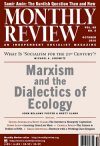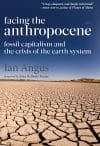Ecology

On August 29, in a historic moment in the history of the planet, the 35-member Anthropocene Working Group (AWG) reported to the International Geological Congress that the Anthropocene epoch in geological history is “stratigraphically real” and should be dated as arising around 1950, displacing the Holocene epoch of the last 12,000 years. The AWG has yet to arrive at a formal decision that would adopt a definite global “signal” (though ten of the thirty-five members currently support using fallout radionuclides from atomic weapons testing as the signal), which would be followed by the designation of a “golden spike” or actual location in the rock, sediment, or ice strata. Yet the general parameters of the onset of the new epoch are clear.… As Colin Waters, secretary of the AWG, explained: “Being able to pinpoint an interval of time is saying something about how we have had an incredible impact on the environment of our planet. The concept of the Anthropocene manages to pull all these ideas of environmental change together.” Most importantly, it tells us that the world economy has generated an anthropogenic rift in the Earth system threatening millions of species, including our own, requiring fundamental changes in the way in which society relates to the earth through production. | more…
The recovery of the ecological-materialist foundations of Karl Marx’s thought, as embodied in his theory of metabolic rift, is redefining both Marxism and ecology in our time, reintegrating the critique of capital with critical natural science. This may seem astonishing to those who were reared on the view that Marx’s ideas were simply a synthesis of German idealism, French utopian socialism, and British political economy.… The rediscovery of Marx’s metabolism and ecological value-form theories, and of their role in the analysis of ecological crises, has generated sharply discordant trends. Despite their importance in the development of both Marxism and ecology, neither idea is without its critics. One manifestation of the divergence on the left in this respect has been an attempt to appropriate aspects of Marx’s social-metabolism analysis in order to promote a crude social “monist” view based on such notions as the social “production of nature” and capitalism’s “singular metabolism.” Such perspectives, though influenced by Marxism, rely on idealist, postmodernist, and hyper-social-constructivist conceptions, which go against any meaningful historical-materialist ecology and tend to downplay (or to dismiss as apocalyptic or catastrophist) all ecological crises—insofar as they are not reducible to the narrow law of value of the system. | more…

Kevin B. Anderson, Marx at the Margins: On Nationalism, Ethnicity and Non-Western Societies, expanded edition (Chicago: University of Chicago Press, 2016), 344 pages, $25, paperback.
Recent years have seen the development of a fresh area of research into Marx’s critique of political economy, based on his previously unpublished economic manuscripts and notebooks, which have been made newly available in the updated edition of the complete works of Marx and Engels, the Marx-Engels-Gesamtausgabe (MEGA). Lucia Pradella published the first detailed analysis in English of Marx’s London Notebooks, and Brill’s Historical Materialism book series recently celebrated its hundredth volume with a translation of Marx’s original manuscript for volume 3 of Capital, based on the new MEGA edition. The same series also published Heather Brown’s Marx on Gender, which drew extensively on his late notebooks. And earlier this year, the second, expanded edition of Kevin Anderson’s Marx at the Margins: On Nationalism, Ethnicity and Non-Western Societies appeared. The first edition of Anderson’s book, published in 2010, inaugurated this new trend in Marxist studies, and it remains among the most important achievements in the field. | more…
The Anthropocene, viewed as a new geological epoch displacing the Holocene epoch of the last 10,000 to 12,000 years, represents what has been called an “anthropogenic rift” in the history of the planet.… Recent scientific evidence suggests that the period from around 1950 on exhibits a major spike, marking a Great Acceleration in human impacts on the environment, with the most dramatic stratigraphic trace of the anthropogenic rift to be found in fallout radionuclides from nuclear weapons testing.… Viewed in this way, the Anthropocene can be seen as corresponding roughly to the rise of the modern environmental movement, which had its beginnings in the protests led by scientists against above-ground nuclear testing after the Second World War, and was to emerge as a wider movement following the publication of Rachel Carson’s Silent Spring in 1962. Carson’s book was soon followed in the 1960s by the very first warnings, by Soviet and U.S. scientists, of accelerated and irreversible global warming. It is this dialectical interrelation between the acceleration into the Anthropocene and the acceleration of a radical environmentalist imperative in response that constitutes the central theme of Ian Angus’s marvelous new book. | more…
A Marxian-Leopoldian Critique
Contemporary North Americans hunt wildlife for a variety of reasons, whether to attain game meat, spend time with family and friends, or take part in a form of outdoor recreation. My focus here will be on…trophy hunting…[—]killing wildlife to enhance one’s status by appropriating the body parts of dead animals for display as trophies, ostensible evidence of hunting skills.… In the United States, trophy hunting organizations, such as Safari Club International and Sportsmen for Fish and Wildlife, claim to promote and defend two allegedly deeply rooted Western traditions: The popular practice of “common people” hunting, and the role that hunters and hunting organizations have played in protecting wilderness and wildlife.… These claims perpetuate a mythologized version of the history of Euro-American hunting. Contrary to their image as “true conservationists,” many trophy hunting organizations have promoted policies and activities with adverse social consequences, contributing to the environmental degradation they claim to oppose. | more…
After fifty years, Paul Baran and Paul Sweezy’s Monopoly Capital has stood the test of time. Not only did it provide a lucid description of midcentury American society, but Monopoly Capital established a framework for analyzing events to come.… By bringing Marxian theory into their historical moment, they fomented many debates and encouraged the development of various perspectives, a legacy that has expanded to include analyses of the labor process, imperialism, finance, globalization, and the environment.… They elucidated a fundamental contradiction of the time. Capitalism is a system of self-expanding value that must continually accumulate, yet is confined by a social and institutional order that precludes rapid accumulation. This framework is especially useful for analyzing the fundamental problems of the twenty-first century. Among those crucial problems is the demise of the hydrocarbon economy. | more…

Thanks to breakthroughs in production and food science, agribusiness has been able to devise new ways to grow more food and get it more places more quickly. There is no shortage of news items on the hundreds of thousands of hybrid poultry—each animal genetically identical to the next—packed together in megabarns, grown out in a matter of months, then slaughtered, processed, and shipped to the other side of the globe. In Big Farms Make Big Flu, a collection of dispatches by turns harrowing and thought-provoking, Rob Wallace tracks the ways influenza and other pathogens emerge from an agriculture controlled by multinational corporations. | more…

On April 8, 2016, in what has already become a historic case on the climate, Magistrate Judge Thomas Coffin of the United States District Court of Oregon ruled against a motion to dismiss, in favor of the youthful plaintiffs in the Children’s Trust lawsuit (Kelley Cascade Rose Juliana, et al. v. United States of America, et al.) and against the defendants, consisting of the federal government and the fossil-fuel industry.… The defendants’ argument to dismiss was directed principally at what they contended were limits on the federal government’s public trust responsibility. It thus turned on whether the United States was obligated simply to follow capitalist precepts with respect to the natural-physical environment, or whether the government had a public trust to maintain the environment for the population and for future generations, going beyond the rules of the market. | more…
One of the lasting contributions of the Frankfurt School of social theorists, represented especially by Max Horkheimer and Theodor Adorno’s 1944 Dialectic of Enlightenment, was the development of a philosophical critique of the domination of nature.… Yet their critique of the Enlightenment exploitation of nature was eventually extended to a critique of Marx himself as an Enlightenment figure, especially in relation to his mature work in Capital.… So all-encompassing was the critique of the “dialectic of the Enlightenment” within the main line of the Frankfurt School, and within what came to be known as “Western Marxism”…, that it led to the estrangement of thinkers in this tradition not only from the later Marx, but also from natural science—and hence nature itself. Consequently, when the ecological movement emerged in the 1960s and ’70s, Western Marxism, with its abstract, philosophical notion of the domination of nature, was ill-equipped to analyze the changing and increasingly perilous forms of material interaction between humanity and nature. | more…
Connections, both real and hoped for, between the labor movement and environmentalists have been news for at least fifteen years now. The possibility of such a connection came into wider view at the Seattle World Trade Organization protests in 1999, when alliances between trade unionists and other protest groups made headlines…. Despite the once-exciting and novel possibility being now institutionalized in such organizations as the Labor Network for Sustainability, the Blue-Green Alliance, and SustainLabour, the thrill seems to be gone for mainstream environmentalist discourse, and labor has largely faded from view.… [The struggle to reduce work hours is fertile ground for uniting the efforts of workers and environmentalists.]… That fight for time, however, came to an end decades ago. Now those with jobs demand higher wages instead, and perhaps even overtime work, while the many unemployed and underemployed fight to work at all. Today the dominant idea of a working-class agenda is to fight to be allowed to sell one’s time. | more…

Science tells us that a new and dangerous stage in planetary evolution has begun—the Anthropocene, a time of rising temperatures, extreme weather, rising oceans, and mass species extinctions. Humanity faces not just more pollution or warmer weather, but a crisis of the Earth System. If business as usual continues, this century will be marked by rapid deterioration of our physical, social, and economic environment. Large parts of Earth will become uninhabitable, and civilization itself will be threatened. Facing the Anthropocene shows what has caused this planetary emergency, and what we must do to meet the challenge. | more…
“Nature,” wrote Raymond Williams in Keywords, “is perhaps the most complex word in the language.” It is derived from the Latin natura, as exemplified by Lucretius’s great didactic poem De rerum natura (On the Nature of Things) from the first century BCE. The word “nature” has three primary, interrelated meanings: (1) the intrinsic properties or essence of things or processes; (2) an inherent force that directs or determines the world; and (3) the material world or universe, the object of our sense perceptions—both in its entirety and variously understood as including or excluding God, spirit, mind, human beings, society, history, culture, etc. | more…




